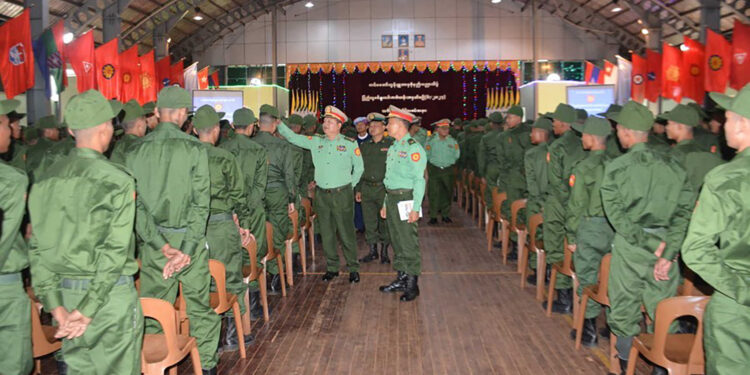The International Labour Organization (ILO) has decided to take action against the Myanmar junta for rights violations including forced recruitment.
The decision to take action under Article 33 of the ILO Constitution was reached during a session of the ILO Governing Body in Geneva from Oct. 28 to Nov. 7.
Article 33 can lead to significant consequences including economic sanctions and international legal proceedings for member states that fail to comply with recommendations from the ILO’s Commission of Inquiry.
The ILO said on Nov. 6 that the Myanmar junta failed to adhere to a resolution adopted in June 2021 and recommendations made by the Commission of Inquiry for Myanmar in 2023.
The recommendations urged military authorities “to immediately cease all forms of violence, torture, and other inhumane treatment against trade union leaders and members; to release and withdraw all criminal charges against trade unionists detained in relation to the exercise of their civil liberties and legitimate trade union activities; and to fully restore the protection of basic civil liberties suspended since the coup d’état.”
They also urged an end to “all forms of forced or compulsory labor by the army and its associated forces, as well as forced recruitment into the army.”
The ILO Governing Body will discuss a draft resolution about measures to be taken at its next session in March 2025, and the final decision will be made at the ILO Conference in June.
Labor rights activists have long campaigned to invoke Article 33 against the junta, which has killed over 5,900 people and arrested more than 27,000 including elected leaders, lawmakers, student activists, peaceful protesters, trade union leaders, and labor rights activists since the coup in 2021.
The Confederation of Trade Unions of Myanmar (CTUM) said possible measures under Article 33 include halting support from UN agencies, suspending humanitarian aid, ceasing diplomatic recognition, designating the military as a terrorist group, and subjecting military leaders involved in labor rights violations to international judicial prosecution and potential economic sanctions.
Article 33 could also pave the way for economic sanctions, international legal proceedings, financial disconnections, and country-specific sanctions, according to labor rights advocates.
In 2000, the ILO imposed sanctions against the then-Myanmar regime led by Than Shwe under Article 33 and labeled his regime a terrorist entity.

















